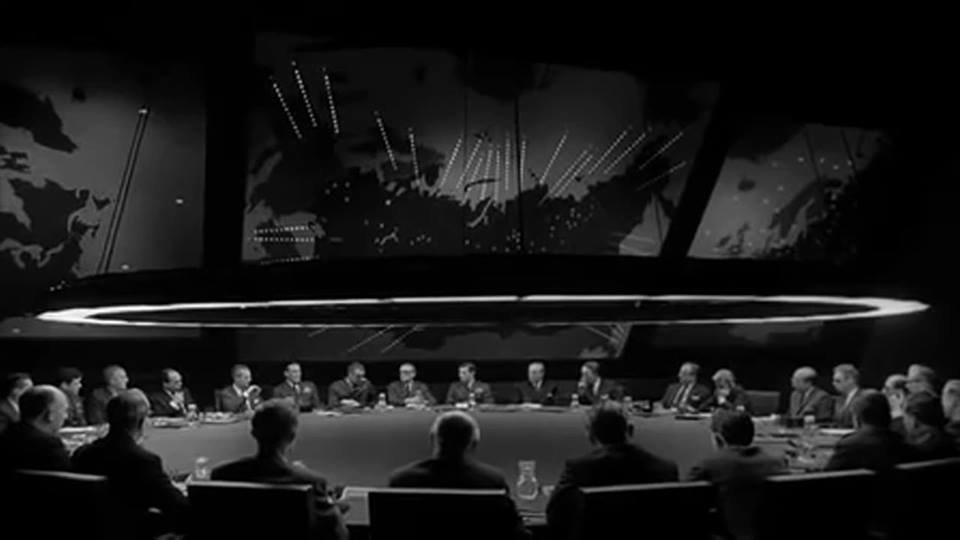-
Posts
1,097 -
Joined
-
Last visited
-
Days Won
1
Content Type
Profiles
Forums
Events
Everything posted by JamesHackerMP
-
Ah. But at any rate, if I hadn't misspelled it (a possibility, though I am uzhully purty gud @ speling) we would not have had this fascinating conversation about poutine, eh? OK, no....I lied: I just felt like asking because that was far more sociable than just googling it. (Funny how "to google" has become a verb.) Perhaps that is one of the differences between our cultures: we like to "chat" more?
-

Russian Elections 2016 -Who Knows, Who Is Interested?
JamesHackerMP replied to August1991's topic in The Rest of the World
I agree that that is likely accurate. -

Americans can now sue Saudi Arabia
JamesHackerMP replied to WestCoastRunner's topic in Federal Politics in the United States
The bill was vetoed, but leading members from both parties have threatened an override of the veto. -
OK. I understand you. I wasn't trying to say "Germany needs term limits". I was only agreeing with the previous commentator that executive term limits are a good idea. I didn't mean to imply they would be valid in a Westminster model, necessarily (although who knows, there's probably some cases of that having happened for all we know...I'm not going to research every single parliamentary model-government in the world because there are a lot). I think part of the reason though, that Canadian PM's have not lasted in office way too long (like, I dunno, 15 years at a pop, or something) is likely because you have dodged the bullet of gerrymandering. That allows greater fluidity, and allows for the PM and his/her party to be dumped in an election (a fact which proves your point about the Westminster system). Don't forget that if the same party remains in power too long, it would be destructive on its own, even if it was with a different head of government. Italy had that problem for some years following the second world war. It was practically a one-party state, give or take, for a while. (A fact which proves my point about how a multiplicity of parties ends up benefiting the people in power, keeping them in power longer, not shorter.)
-
Also the power of the German president in the 1949 Basic Law (constitution) is very limited, compared with the Weimar Republic. Field Marshall von Hindenburg, the last reichspraesident (if of course you don't count Grand Admiral Karl Doenitz since he didn't hold that office "democratically") was practically ruling the government by executive fiat through non-partisan (or non-majority-supported) chancellors. When the FRG was founded they didn't want that situation again, so the powers of the German bundespraesident are very severely curtailed compared to the Weimar reichspraesident. So I wouldn't say that the bundeskanzler (Federal Chancellor) serves at the discretion of the bundespraesident as you put it. The "discretion" comes from the Federal Diet (bundestag). The president's role is very nominal in this case, except in a very limited set of circumstances where his/her own discretion would be required.
-
No it certainly isn't. In Germany, though, the constitution is a little more "clear cut" about the president's reserve powers than, say, Canada or Australia (the latter of which did get into a constitutional crisis when the GG used--some say abused--his reserve powers). I might point out that a lot of parliamentary heads of government have more power than the US president in some instances. So they could still limit a person's term to a certain number of parliaments or general elections he/she may serve through. And actually, Japan, which is a parliamentary democracy, *does* have such a limit on their prime minister.
-
Agreed.
-
the US aside, here are a two prominent democratic political systems that use some flavor of proportional representation. Japan is a perfect example of what I mean. Ten parties have seats in the 480-member House of Representatives and 5 seats are independents (December 2014 election). The House of Councillors is an integral part of the system, more powerful in Japan than your Senate is in Canada; but for now, I'll concentrate on the lower house, since it's what is needed to form government. Despite this plethora of parties, the Liberal Democratic Party has maintained a stranglehold over the system since 1954 with only a couple brief interludes. Germany, I will admit, is likely more pluralistic, along your lines of thinking, and kind of proves your point---but not entirely. It's certainly an interesting case worth mentioning. However, Germany restricts motions of no-confidence (constructive no confidence rule) and requires a party to poll at least 5% of the vote to have block seats in the Bundestag (Federal Diet). These two components prevent the chaotic situation of the Weimar Republic, where they held elections more frequently than people change their underwear and governments were hard to form because of the plethora of small parties (which proves one of my points: the fluidity of the system was simultaneously a handicap that led to instability and the eventual collapse of Democracy in the Weimar Republic). German's MMP (mixed member majoritarian) allows the voter to vote for a party, to be allocated among the [roughly] half of the seats in the Bundestag, and to vote for a single-member district candidate. Germany has been described as a "chancellor democracy" soon after its founding in 1949, meaning a crap-ton of the executive power is vested in Mrs. Merkel. That would be just fine, if the chancellorship was able to rotate between the parties that win seats--currently Die Linke ("the Left"), Christian Democrats (technically two parties, but they act as if they were one), the SDP (Social Democrats), and Alliance 90/the Greens (an amalgamation of the Green Party and a left wing party). But the CDU/CSU (Christian dems.) failed to gain an absolute majority in the Bundestag, so what did Mrs Merkel do? She didn't negotiate an alliance with the small parties to tip the numbers so they'd have just enough for a majority, she actually formed a coalition government with the OTHER largest party, the Social Democrats! That would be like Liberal and Conservative forming an alliance in the House of Commons. It would be virtually unstoppable, when you think about it. 504 seats out of the 631 in the Bundestag (a whopping 80%!!!) are the present coalition. Of course, that coalition could "fall out", but it hasn't done so since it was sworn in following the 2013 election. Despite their four (sometimes five) party system, Mrs Merkel has maintained her hold on power since 2005. Provided she serves to the end of the present four-year mandate, that will be a term of almost 13 years. Take note, also, that out of the eight chancellors since 1949, they've always been from the Christian Democrats (CDU/CSU) or the Social Democrats (SPD). Sure, they've had plenty of governing coalitions (though never of the two largest parties as far as I know) but what's the point, when the most powerful seat in the cabinet is the chancellor, and it's been denied to smaller parties? There are more examples I could give but we'd be here all day. Some of these examples show the exact opposite problem, the fluidity and plurality of the governments of some countries have actually compromised their stability. (Third & Fourth Republics in France, Italy, Weimar Rep I mentioned). If you really research it, it'll likely prove one of two possibilities: that the PR decreases political plurality, not increases it, or that it goes too far and there's gross instability. That's the best I can explain it here. The problem with the US you mentioned, the result being a foregone conclusion, could be fixed (if the people in power wanted it to be). It's due to gerrymandering of the congressional and state legislative districts. And that certain does add to voter apathy I'll admit readily. Also, the French Republic (5th) is not a presidential or parliamentary democracy, it's a semipresidential.
-

Canadian judges are often incompetent
JamesHackerMP replied to Argus's topic in Federal Politics in Canada
Wait, appointed by the Crown on the advice of the PM? Meaning, in practical terms, they're appointed by prime ministerial fiat? -
OMG I wouldn't know. I am not into either of the three you mentioned.
-
Oh, it makes our "choices clearer" all right. The expression "Clearly, we're f*****d" comes to mind. Once upon a time, it did encourage moderation. Today? No. Today, the system is far more polarized than it was in, say, the 1960s or even for a little while after that. If you have two choices and they're the result of a moderating process, fine. If you have two choices and they are not the result of said process, then it's not much of a choice. It's more like a conjuring trick: pick any card, you always pick the one the magician wanted you to pick. At least a deck of cards has 52 choices, not two. I believe in first past the post, normally, because a lot of Americans are tied to "their" congressman, whether they like him/her or not. They can do things for you whether you voted for them or not. It's better that they're loyal to their constituents than to a party machine. But today, with polarization of American politics, they're starting to vote the party line, and the party line doesn't always respect the wishes of said members' constituents. I agree that with FPTP and an electoral college, a two-party system makes more sense. It does not, however when the system has become polarized.
-

Canadian judges are often incompetent
JamesHackerMP replied to Argus's topic in Federal Politics in Canada
How *are* judges appointed in Canada out of curiosity? -

Provincial Government Powers?
JamesHackerMP replied to JamesHackerMP's topic in Provincial Politics in Canada
I think Luttwak was talking about centralization as one of the requirements for the ability to stage a coup d'etat. -

Provincial Government Powers?
JamesHackerMP replied to JamesHackerMP's topic in Provincial Politics in Canada
A friend of mine lived in AK. He rather liked it, it's just damn cold. -

A "good" book on Canadian history
JamesHackerMP replied to JamesHackerMP's topic in Political Philosophy
That aside, he's mostly been talking about the so-called "pre Columbian" societies present in North America at the time. It's interesting. -

A "good" book on Canadian history
JamesHackerMP replied to JamesHackerMP's topic in Political Philosophy
Incidentally I went ahead and bought it. Found a copy on Alibris for $7 (plus shipping). Not bad for a book that's $17 on Kindle, $50 in print! It's hard to find them too cheap when they're quite recent, this book was published in 2015 I think. -

A "good" book on Canadian history
JamesHackerMP replied to JamesHackerMP's topic in Political Philosophy
Well, I did download a sample of the one that cost $17 on Kindle. Interesting forward, though I think he tries to compare Canada to the US a bit too much. The author seems to have a bit of an inferiority complex when it comes to the United States, and a blind spot to his own country's faults. That said, I'm kind of hooked, because it is interesting nonetheless. I might spring the $17 and download the whole thing. In the very least, it does seem to be a "good book on Canada". -

A "good" book on Canadian history
JamesHackerMP replied to JamesHackerMP's topic in Political Philosophy
Was looking for something shorter than 2 volumes, lol.

